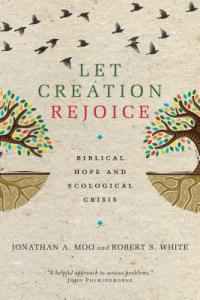
Let Creation Rejoice: Biblical Hope and Ecological Crisis by Jonathan A. Moo and Robert S. White. Downers Grove: InterVarsity Press, 2014.
Summary: A scientist and a theologian get together to assess both environmental trends and biblical teaching and contend that there are reasons for serious concern, concerted action, and because of the gospel, for hope.
I have an interesting collection of Facebook friends. On any given day, I can find posts predicting apocalyptic consequences for every living thing on earth because of our pollution of earth, water, and air, and equally ardent posts decrying all of this as “bunk”. Sadly, the discourse that seems to be occurring in the halls of government doesn’t seem much different.
What I find rarely taking place are thoughtful conversations between scientists and people of faith considering what we may learn of these things and our call from God from listening both to the book of scripture and the book of creation. This book is a wonderful step in that direction as a scientist and theologian have collaborated to give us an account that is at once challenging, and yet filled with hope, that both considers the data of researchers and the data of scripture.
Following an introductory chapter that decries both the apocalyptics and the deniers, the next two chapters summarize the “state of affairs” in our world today, considering human population growth, the decrease of biodiversity, the growing water crisis, concerns about nitrogen buildups due to artificial fertilizers, our food supply, and finally in a chapter to itself, the growing consensus among serious scientists of unprecedented CO2 buildup in the atmosphere, current warming trends, and, what seemed to me, fairly measured discussion of what might happen in the future.
The next five chapters consider relevant scriptures, both outlining why the creation is not rejoicing, and how it may, and ultimately will. Chapter 4 centers on Jesus’ proclamation of “jubilee” in Luke 4:15-16. Chapter 5 focuses around Romans 8:18-25 and the groaning creation longing for release, that will come along with the redemption of God’s people. Chapter 6 explores 2 Peter 3:10-13 and the common contention of “why care if it is all going to burn.” The authors argue that the burning is one of removing the “veil” of heaven as well as purifying the earth, not consuming it all. It is meant as a warning of judgment that calls Peter’s readers to present faithfulness in all things, including stewardship of the creation.
Chapter 7 considers the coming of Christ as a thief in the night and the call to be responsible stewards ready to give an answer for our stewardship of the creation. Chapter 8, on the book of Revelation, has particularly trenchant remarks about “Babylon” whose wealth is built on the commodification of humans and at the expense of their lives, a warning to any great power that accrues the wealth of the world to itself at the expense of the labor and lives of others. The book closes with exhortation, challenge and hope. We are to live as those “not of this world”, “to always pray and never give up”, to not take refuge in excuses or rationalizations, and to live in love, joy and hope, realizing we can both anticipate the new creation to come in our acts of faithfulness, and yet that it will come as a gift of God and not a human accomplishment.
I was sobered as I considered that when I knowingly consume the earth’s resources in a way that subjugates others and contribute to conditions that lead to the death of others, I am complicit in slavery and death. Reading of God’s concern for his creatures in Genesis 9, I’m struck by how much we have to answer for concerning the extinction of so many creatures God has made. I can rationalize and deny in all sorts of ways. It seems like the only real course is to repent and lament and cast myself on the mercies of God and do what is set before me.
That’s where the hope comes in. God knows that our own feeble efforts to clean up our messes only lead to more mess, and that, while we can begin in a way that anticipates his new creation, our hope is that he will return to finish that work of renewal.
This book moves beyond the polemics to sober appraisal and a call to biblically rooted Christian faithfulness. Ultimately, its appeal is rooted not in the data of science but in the authority of the Bible. At one point one of the authors observes that a climate skeptic he talked to actually lived a humbler, more earth-friendly life stewarding God’s creation than he. It may just be that convincing Christians to live out their call as stewards of creation may be far more effective than arguments pro and con about climate science. This book is a good place to begin
Editor’s Note: Thank-you to Bob Trube for sharing his review of Let Creation Rejoice: Biblical Hope and Ecological Crisis. As you may remember, Hannah Eagleson participated in the 2015 Lausanne Creation Care and Gospel Conference. Furthermore, ESN has more broadly explored creation care. As always, if you have a book recommendation and/or desire to write a review, then please contact ESN 🙂 ~ Thomas B. Grosh IV, Associate Director, Emerging Scholars Network
Bob Trube is Associate Director of Faculty Ministry and Director of the Emerging Scholars Network. He blogs on books regularly at bobonbooks.com. He resides in Columbus, Ohio, with Marilyn and enjoys reading, gardening, choral singing, and plein air painting.

Leave a Reply